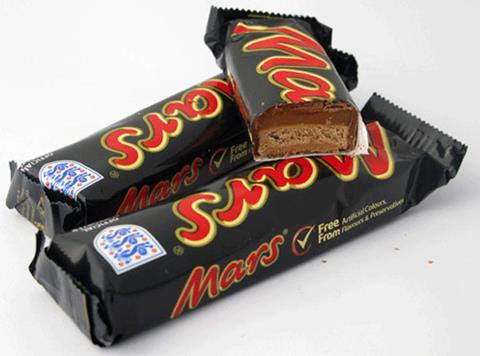
Mars is voluntarily recalling millions of chocolate bars produced in the Netherlands and sold globally – including in the UK – because of fears over plastic contamination. Here’s what we know so far.
What’s caused all this?
A consumer in Germany found a small piece of red plastic in a Snickers bar, triggering a voluntarily recall of chocolate products on Tuesday (23 February).
Mars is investigating how this happened but says it believes it’s an “isolated incident”.
Mars Netherlands head Jack Tabbers has been quoted in the Dutch media as saying the piece is believed to have come from a cap on a plastic tube. ”The problem is that the piece was crushed and thus has sharp edges, which could raise the risk of damage or choking in small children,” he was quoted as saying.
German tabloid Bild claims the plastic piece found in the Snickers bar was smaller than 0.5cm.
Which products are being recalled?
Chocolate products made in Mars’ Dutch factory in Veghel during the period of 5 December 2015 to 18 January 2016 and with best-before dates between 19 June 2016 and 8 January 2017.
In the UK, Mars initially said it’s mainly funsize products that are affected, including funsize Mars, Milky Way and some Celebrations mixes. However, on Thursday Lidl recalled some six-packs of full-size Mars and Snickers bars in the UK that were supplied to it through Mars Germany.
The full list of products recalled in the UK can be found here.
How many countries are affected?
Dutch media reports put the number of countries at 55, but this figure hasn’t been confirmed by Mars. The company says only that products made at Veghel are distributed around the world, including to duty-free retailers, and “numerous countries” are involved.
What are consumers advised to do?
Small pieces of plastic are a possible risk to health and consumers should therefore not eat the products that are being recalled.
Instead, they should contact the Mars consumer care team on 0800 952 0084, Mars R1, FREEPOST, Mars Consumer Care, or email recall@uk.mars.com
As only products made in the Netherlands are affected, Mars is telling consumers to look out for “Mars Netherlands” labels if they are unsure if a product they’ve bought might be being recalled.
What’s going to happen with all those recalled bars?
No word yet from Mars UK on this, but in the Netherlands Mars says they are most likely going to be incinerated.
What is all this costing Mars?
Mars isn’t putting any figures on it for now, and – as a privately held company – doesn’t have to publish financial information. Nor is it saying how many products are being recalled.
However, as it is canning four weeks’ worth of production at Veghel, millions of products are involved. In the Netherlands alone, the figure has been put at four million by Dutch media.
According to the Mars Netherlands website, Veghel produces some 27 million chocolate bars a day, though this also includes brands and lines not involved in the recall.
Food technologist David Harrison of the Food Management Services consultancy in Wiltshire says he believes the recall is “probably the biggest in 10 years”.
What about any long-term damage to the Mars brand?
Reputation management experts don’t think there will be any. Mars reacted quickly, transparently and comprehensively, says Jonathan Hemus, founder of Insignia Communications. “They made some good decisions so far that are likely to protect their long-term reputation. Crucially, it was a voluntary recall – there’s no sense that the business has been forced into this in any way or that something untoward was ‘uncovered’.”
Though Mars has faced some criticism over its communications over the recall – particularly over its website and customer care lines in some countries collapsing once news of the recall got out – the recall itself looks like “a highly organised textbook recall to me,” adds Rob Metcalfe of Richmond Towers. “Because they’ve handled it very efficiently, I am sure it will do them no lasting sales damage at all,” he says. “The public are actually quite reasonable (apart from the litigious few) about these things and understand that machines will break from time to time. Reputationally, I would forecast either a neutral or positive outcome for Mars – as long as it doesn’t happen again.”
How is the recall being reported elsewhere?
In the Netherlands, much of the coverage has focused on the enormous task involved in pulling the affected bars off the market. Retailers like Albert Heijn have put in place extra resources to remove products from shelves and ensure the affected barcodes can no longer be scanned at checkouts.
Press coverage has also highlighted the particular challenge faced by vending machine operators. Vending @ Work, which operates about 2,000 machines in the Netherlands, is quoted as saying it expects to remove about 10,000 bars and has called in extra staff to help with the task.
Dutch media has also pointed out the importance of the Veghel factory to Mars’ European business. The factory was Mars’ first in Europe and remains its biggest European factory, employs 1,250 staff and is seen as a best practice model for other Mars production plants. Last summer, Mars announced it planned to invest €100 million in Veghel over the next 10 years.
In Germany, Mars is facing criticism for making it too onerous for consumers to get refunds on products that are being recalled. Consumers are being asked to call the German Mars consumer care line first and then have to send in products by post to get a replacement.
“This process is not consumer friendly,” a spokeswoman for one of Germany’s consumer rights bodies told Bild. “It’s a lot of work for a chocolate bar. I fear it’s been made so complicated to ensure very few people actually go through with it.”
Mars has also been criticised for having its website offline for several hours on Tuesday as news of the recall broke, and for having its customer careline collapse.







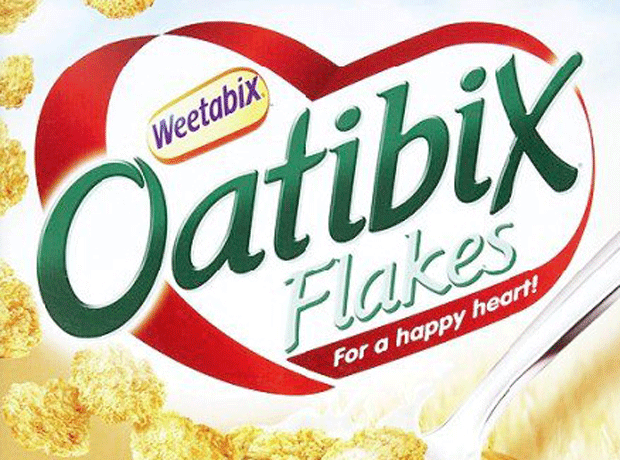
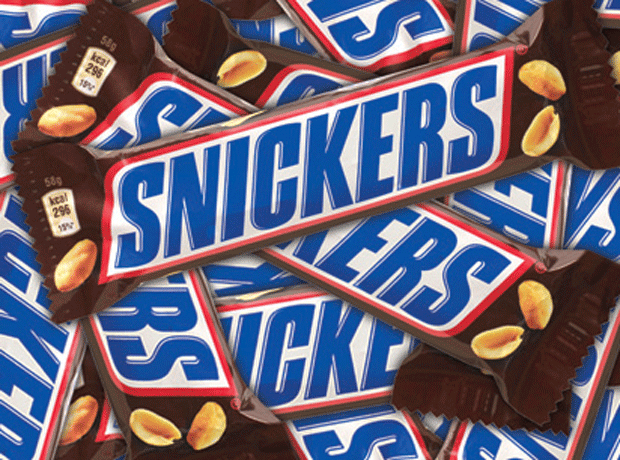
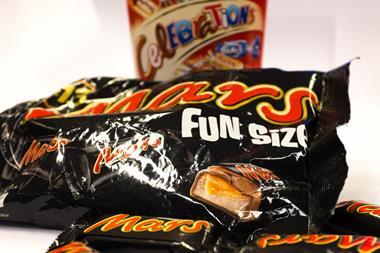
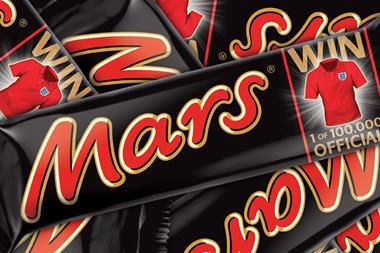
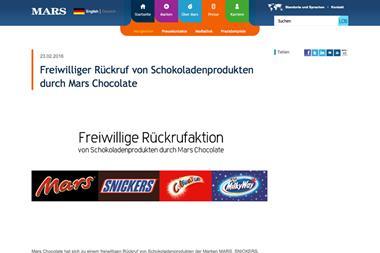






No comments yet